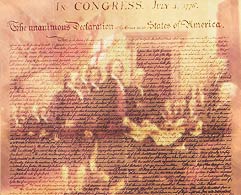The Declaration of Independence was written by Thomas Jefferson in just 17 days. Even more amazing is that he wrote it without the use of any reference materials. Jefferson was well educated, having studied philosophy and law at the College of William and Mary. He was also a voracious reader, which is evident from the 1815 sale of more than 6,700 of his books to the Library of Congress. Being so well read, he was doubtlessly exposed to many ideas that influenced him while writing the Declaration of Independence.
However, he was also a deeply religious man, and the Declaration certainly reflects this. In the Declaration, there is an appeal to the "Supreme Judge of the world" and to "the laws of nature and nature's God." It concludes with these words: "And for support of this Declaration, with a firm reliance on the Protection of Divine Providence, we mutually pledge to each other our Lives, our Fortunes, and our Sacred Honor."
Many have tried to negate God's hand in inspiring the Declaration of Independence by painting Jefferson as an unbeliever. They point to the copies of the New Testament, found after his death, with Scriptures referring to Jesus' miracles cut out as proof. However, his own writings provide a better explanation and put the question of his faith to rest:
"I too have made a wee-little book ... which I call the "Philosophy of Jesus." It is ... made by cutting the texts out of the book, and arranging them on the pages of a blank book, in a certain order of time and subject. A more beautiful or precious morsel of ethics I have never seen. It is a document in proof that I am a real Christian, that is to say, a disciple of the doctrines of Jesus ..."
This book was later published as the Jefferson Bible. Jefferson also compiled another book which he called The Life and Morals of Jesus. It was a collection of verses from the New Testament in Greek, Latin, French and English. He wrote to a friend that he read nightly from this book before going to bed. Unquestionably, Jefferson's faith was a powerful influence in his life and on his writing of the Declaration of Independence.
As we celebrate this year, may we remember the sacrifices made for the freedoms we enjoy* and never take them for granted. May we also find strength to endure and triumph during trials like the American Founding Fathers did. May we not only thank God for inspiring the faith of men like Thomas Jefferson, but also recognize His divine hand in our own lives.
*For a careful review of what the signers faced and paid for signing the Declaration of Independence and supporting the revolutionary war, many documents and opinions are available. As a place to begin, see a researched analysis by Mark Dixon.
Steven W. Allen is author of Founding Fathers - Uncommon Heroes, which examines the lives of six Founding Fathers, including how they turned to God for strength and inspiration. More information about the book can be found online.











Comments
Have thoughts on this article? Leave a comment